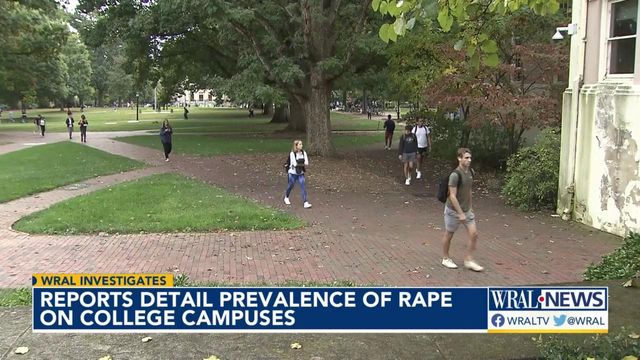'Something has to change': UNC mother advocates for change about when alerts are sent for on-campus sex crimes
Earlier this week, WRAL's Sarah Krueger's reported that three sexual assaults were reported on the campus of the University of North Carolina at Chapel Hill over just five days.
University leadership provided a statement.
“These types of incidents are not unique to UNC-Chapel Hill or to college campuses in general,” UNC’s statement read in part. “UNC-Chapel Hill’s top priority is the safety of its students, faculty and staff and we take each report seriously.”
The university has had 13 reported sex crimes this semester, which began in mid-August. Eleven of the reported sex crimes happened in residence halls, where many freshman live. All first-year students must stay in dorms at UNC.
In that same time frame, North Carolina State University had five reported sex crimes and Duke University had one.
WRAL Investigates dug through annual reports about safety on campus, which universities that receive federal funding are required to release each year.
According to UNC's Annual Report, there were:
- 19 reported rapes on campus in 2021
- 14 in 2020
- 20 in 2019
In 2021, both Duke and NC State had five reported rapes on campus.
“Something has to change, and there are thousands of parents and students as well that are looking for that change,” said a mother of a student sexually assaulted by a stranger last month at Carmichael Residence Hall.
The mother, who did not want to be identified to help protect her son’s identity, is fighting for changes.
Part of the change she wants to see is in the Clery Act, which is the law that dictates when universities must send out alerts for crimes.
“My son was sexually assaulted approximately 5 p.m. and the alert didn’t go out for five hours,” She said. “You could have been in the dorm and not known it had ever happened.”
The Clery Act states alerts must be sent in a timely manner for incidents that pose a serious or continuing threat to safety.
“The law itself doesn’t define what is considered timely,” said Clery Center Associate Executive Director Abigail Boyer. “It really is going to be based on the level of information that an institution has at the time.
“So, what we work with institutions to do is to develop not only their policies for timely warning, but how do you implement practices for how you’re making a consistent evaluation of what you determine to be a serious or ongoing threat?”
The Clery Center is a nonprofit, which helps colleges and universities meet the standards of the Clery Act.
The interpretation of those terms is subjective, which means sometimes alerts do not go out at all, or are slower than some people would like.
“It allows for loopholes and the administration to hide behind it,” the mother said.
“I think it’d be difficult, especially with it being a federal law,” Boyer said of the possibility of changing the Clery Act. “I think it’d be difficult to put a specific timeframe around it.
“But I think to your point, institutions need to have practices in place to ensure that that collaboration across different departments is happening quickly so that information is able to get out as quickly as possible.”
Regardless of what is dictated by law, the mother of the UNC victim believes universities should go beyond the law, on their own accord, to be transparent.
The Clery Act also says that universities must post public crime logs, showing the crimes happening on and near campus.
Some students WRAL News spoke with said they make a habit of checking that so they can stay informed rather than relying on alerts.
Resources for UNC students
If a person or someone they know has experienced sexual violence, there are support and reporting resources available at the University and in the Chapel Hill community.
The Gender Violence Services Coordinators (GVSCs) provide confidential support and advocacy for any student, faculty, staff or post-doctoral scholar impacted by sexual violence, relationship violence, stalking or sexual and gender-based harassment. To learn more about support and services, please visit gvsc.unc.edu. If individuals are interested in connecting with a GVSC, they can email gvsc@unc.edu or call 919-962-1343.
Counseling and Psychological Services (CAPS) is available 24 hours a day. Visit caps.unc.edu or call 919-966-3658.
The Equal Opportunity and Compliance Office (EOC) oversees the campus report and response process for reports of campus sexual misconduct and is available to discuss reporting options, supportive measures and accommodations. Individuals may connect with a Report and Response Coordinator by email at reportandresponse@unc.edu or by phone at 919-445-2759.
The UNC Police Department is available 24 hours a day by calling 911 in an emergency or 919-962-8100 for non-emergency assistance. Officers are also available in person at the Public Safety Building located at 285 Manning Drive.
The Orange County Rape Crisis Center has a confidential hotline available 24 hours a day. Visit ocrcc.org or call 866-WE-LISTEN (866-935-4783).
For more information about campus and community resources and reporting options please visit the Safe at UNC website.
In Depth With Dan
Dan Haggerty is a reporter and anchor for WRAL. He’s won four regional Emmy awards for his anchoring and reporting in Fort Myers, Florida; Cleveland; San Diego; Dallas; Portland, Oregon and Raleigh, North Carolina. He is proud to call the Triangle home.
Anyone who has an idea for In Depth with Dan can email him at dan@wral.com.











